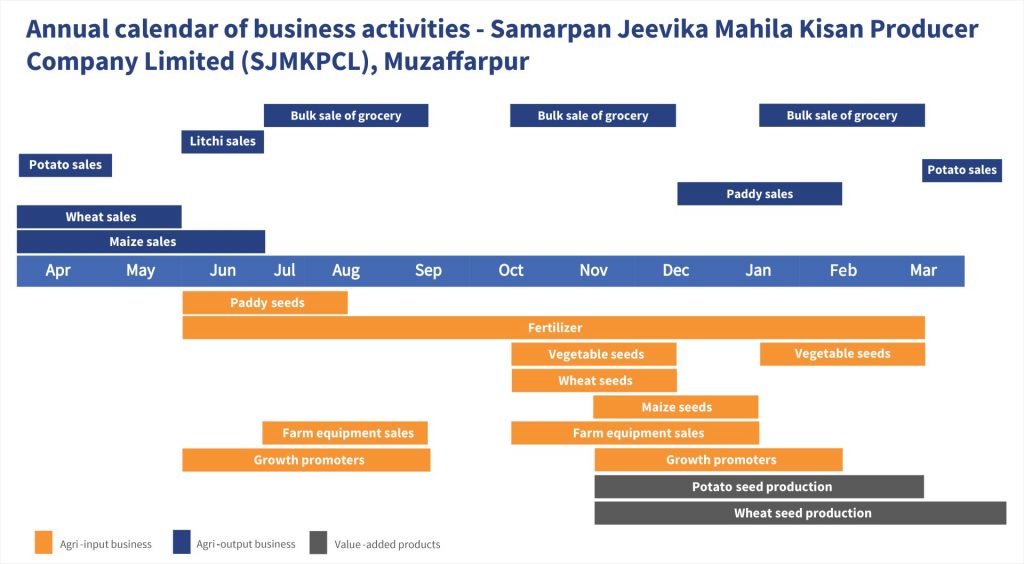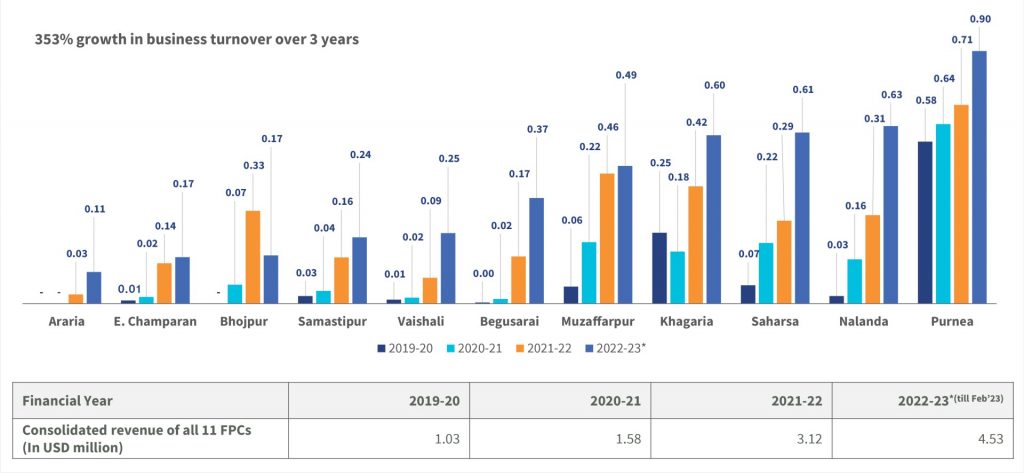Overcoming challenges in Farmer Producer Company (FPC) scaling and sustainability: Lessons from JEEViKA in Bihar
 by Rajnish Kumar, TVS Ravi Kumar and Devesh Kumar
by Rajnish Kumar, TVS Ravi Kumar and Devesh Kumar Apr 13, 2023
Apr 13, 2023 6 min
6 min
FPCs are powerful tools to allow smallholder farmers more control over the markets where they trade. This helps to transform agriculture productivity and increase small-scale producers’ incomes. However, cluster-based business organizations should recognize the inherent challenges that FPCs face and learn to address the pitfalls in managing FPCs to realize their potential. This blog outlines these challenges and share insights to address such pitfalls.
The Government of India’s 10,000 FPO scheme, renewed focus on the aggregation of small, marginal and landless farmers to facilitate market linkages to enhance incomes and livelihoods. As a result, the number of registered Farmer Producer Companies (FPCs) has increased from 8,341 to 15,948 between 2019 and 2022, presenting a significant opportunity to transform agriculture marketing for smallholder farmers. A diverse group of actors, including government agencies, corporate social responsibility arms of private corporations, foundations, NGOs, and agri-business conglomerates have joined forces in the form of cluster-based business organizations (CBBOs) to catalyse FPC formation. The Bihar Rural Livelihoods Promotion Society (BRLPS), also known as JEEViKA, recognizes the transformative impact of FPCs on the lives of smallholder farmers and, supports the development of FPCs across Bihar. In partnership with MSC, JEEViKA works to enhance 26 FPCs’ capacities, including innovative and sustainable value chains, effective governance structures, and the empowerment of women farmers.
However, growth is not without its challenges. Despite efforts to foster the development of FPCs, the Ministry of Corporate Affairs (MCA) concluded that 45% of FPCs older than seven years were moribund at the end of FY 2021-22. Some attribute this non-functionality to the typical high failure rate of small businesses, while others point to deeper design and operational issues. In this blog, we discuss key, yet overlooked, factors obstructing the growth and long-term viability of FPCs, and the solutions JEEViKA is using to address them.
Hiring technically knowledgeable staff: Agribusiness requires specialized skills and expertise to generate profitable transactions. Most FPCs start off as simple aggregators of commodities where margins tend to be low. For example, aggregator margins are in the range of 2-3% for non-perishable commodities such as grains and cereals. To ensure sustained profitability, FPC management need to manage and measure quality, understand the specific market for each quality grade, negotiate optimal rates for logistics and storage, manage working capital, and facilitate strong market connections for access to timely information. These skills are developed through years of experience.
However, CBBOs typically deploy their own staff, who come from a social development background, to manage newly established FPCs. These staff are competent in community mobilization but lack the necessary agri-business skills to run a profitable FPC. Under the 10,000 FPO scheme, the salary support provided by the government to CBBOs is up to INR 25,000 (USD 312.5) per month for 3 years, yet MSC has found that recruiting experienced candidates for this salary is not possible. Recognizing that knowledgeable and qualified candidates require a higher salary, JEEViKA has made the strategic decision to hire individuals with agri-business backgrounds to act as CEOs of its FPCs and offers them market compensation. While policymakers need to rethink the support provided to FPCs, CBBOs also have to be resourceful to meet the gap.
Multiple business lines and multiple commodities: Many FPCs are formed as single commodity companies, influenced by the success of dairy FPCs promoted by the National Dairy Development Board (NDDB). As a single commodity company, the FPC is tied to the production and sale of one commodity. However, our experience shows that single agri-commodity FPCs struggle to thrive if they just aggregate and trade. While single-commodity FPCs do succeed, particularly those that undertake secondary processing and achieve substantial volumes, they require significant capital investment and specialized skills, such as food technology and processing for which many FPCs lack the resources.
The majority of small-scale farmers are involved in two or three cropping cycles annually, known as kharif (sowing post-monsoon), rabi (sowing in winter), and zaid (sowing in summer) and as a result, would be better served by FPCs that cater to the many commodities grown in the region, while providing the necessary inputs for each cropping season. Diversifying into multiple commodities offers several benefits including better staff utilization and productivity, effective use and rotation of working capital, increased resilience against commodity price fluctuations, and more active involvement of its members.
The transition to multiple business lines by the FPCs supported by Jeevika has proven successful. A prime example is Samarpan JEEViKA Mahila Kisan Producer Company Limited (SJMKPCL), which operates in three distinct business areas: agri-outputs, agri-inputs, and other businesses. The agri-outputs line includes commodities like paddy, wheat, litchi, and potato. The agri-inputs line covers a range of products like seeds, fertilizers, growth promoters, and farm equipment. The other business line includes seed production and bulk purchase of food and groceries for women members. With this diverse range of business lines, SJMKPCL has achieved profitability for the past two years. The figure below illustrates Samarpan FPC’s different business lines throughout the financial year.

Social capital in the local communities: The success of FPCs, in part, lies in the active involvement of its members. Developing the necessary social capital among the community can be a time-consuming process, but CBBOs with a history of impactful social and economic development initiatives have a head start over those starting their operations anew. For example, JEEViKA, with over 15 years of experience in livelihood promotion, financial linkages, and women’s economic empowerment, is well-positioned to mobilize members, establish strong leadership, and educate communities about the benefits of FPCs. Building this social capital among its members helps FPCs overcome the influence of middlemen and other intermediaries who have built their own social capital over time.
Financial support from inception to maturity: One of the critical roadblocks for FPO growth is working capital. Both trading in agri-commodities and agri-inputs require working capital to maximize business opportunities. Commercial banks and mainstream non-bank finance companies (NBFCs) depend on robust balance sheets and track records as part of the underwriting process, while the majority of FPCs are nascent or early stage and may not have the required net worth to obtain the requisite credit.
Most FPCs are also poorly capitalized despite special credit guarantee schemes and the equity grant scheme of SFAC. Only 11.2% of FPCs registered at the end of FY 21 across India have paid in capital equal to or more than INR 1 million (USD 12,500). Between FY 2015 to FY 2022, only 839 FPCs had access to equity grant from SFAC, while only 282 FPCs were sanctioned credit guarantees. JEEViKA provides working capital grants to newly formed FPCs in the early years to meet their liquidity needs, thereby enabling them to grow their businesses without the need for commercial capital. JEEViKA’s ability to raise funds is not easy to replicate for most CBBOs and there is a genuine need for philanthropic capital to provide critical seed money for FPCs to meet the financing gap in the initial 2-3 years. The government/policymakers could also help by expanding coverage of the equity grant and credit guarantee schemes, increasing upper limits for good-performing FPCs, and encouraging commercial banks to enter the FPC lending market.
Simplifying the business environment for FPCs: Despite efforts to promote FPCs in India, many face difficulties obtaining basic business licenses, particularly to sell agriculture inputs such as fertilizers, because local government officials have discretion to issue these licenses. FPCs often lack the knowledge and networks to secure them. The state governments can ease the licensing process by creating a common agri-inputs license (seeds, fertilizers, and pesticides) for FPCs.
Additionally, there are numerous regulatory compliance requirements to which FPCs must adhere, such as filing Goods and Services Taxes (GST) and Income Tax (IT) returns, conducting annual audits, and holding Annual General Meetings (AGMs). Non-compliance could result in fines and legal consequences. To mitigate these challenges, JEEViKA provides professional support to manage the compliance of its FPCs and concurrently trains their managers on the necessary requirements, ensuring they stay up-to-date and avoid missing regulatory deadlines.
This is another area where philanthropic organizations could support the growth of FPCs through investments in the training of auditors and building the capacity of FPC managers in areas of regulatory compliance, business licenses, etc. This approach mirrors the large-scale efforts put into training of microfinance institutions from two decades ago.
Responding to the constraints above has fueled a robust growth trajectory for JEEViKA FPCs. Over the last three years, total business revenue of the FPCs experienced growth of more than 353% as they continue to progress towards financial profitability.

FPCs are powerful tools to allow smallholder farmers to have more control over the markets in which they trade. FPCs can channel high-quality services like access to inputs, credible buyers, advisory, etc. to transform agriculture productivity and increase the incomes of small-scale producers. However, CBBOs should recognize the inherent challenges that FPCs face and learn from the likes of JEEViKA, which has addressed the pitfalls associated with managing FPCs, helped them deploy the right business models, acquire the right talent and arrange for necessary and adequate financing to ensure the FPCs’ potential is realized.



Leave comments